PhD Program
Doctoral Program
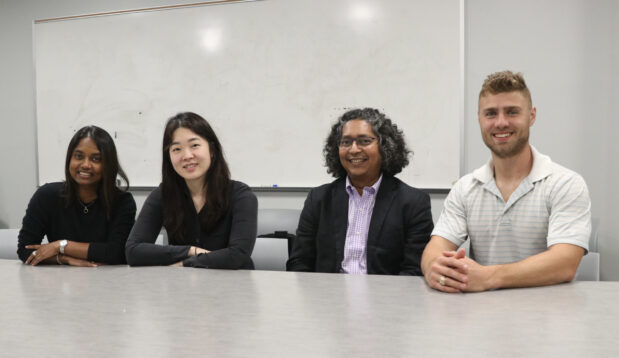
Overview
Gain critical thinking skills, independence and unparalleled hands-on experience with Grady’s top-ranked Ph.D. program in mass communication. Drawing on the resources of Grady College, our curriculum prepares scholars for academic careers in teaching and research or for professional careers in the media industry and government.
Your Ph.D. from Grady is granted in recognition of research proficiency, breadth and soundness of scholarship and a thorough knowledge of mass communication and related fields. Students are encouraged to develop their own theoretical and methodological approaches to mass communication while studying diverse phenomena in the field.
PH.D. FOCUS AREAS
The Grady College of Journalism and Mass Communication at the University of Georgia is currently accepting applications in the focus areas of advertising and public relations, journalism and entertainment and media studies-related research and scholarship.
Students interested in advertising or public relations have the opportunity to learn and apply a wide array of methodological and theoretical approaches to the field, including advertising and culture, consumer and media psychology, political and public affairs communication, social and digital communication strategies and much more.
Students enrolled in the entertainment and media studies focus area base their research on digital and emerging media studies, mediated representations of gender, sexuality, race, and ethnicity, entertainment media industries and labor, development communication and more.
Students apply intense research to the field of journalism in this focus are, studying cross-cultural communication, media attention and cognition, newsroom sociology, sports media, visual communication and much more.
Additional Information
Download our additional Ph.D. fact sheets here
Why choose Grady for your Ph.D.?
Research at Grady College
PhD Handbook
Frequently Asked Questions
-
We do not accept transfer students in our graduate programs, nor do we accept transfer credits from other institutions. If you wish to study at UGA, you must start at the beginning of your course work to complete your degree here.
Students admitted from another UGA graduate program may be allowed to use two courses to satisfy cognate requirements. The decision is up to your advisor and/or major professor.
Our program does not defer applications to the next year; if you are accepted but unable to enroll the next fall, you’ll need to reapply.
You must reapply, following the same procedure and submitting the same admission materials.
The length of the MA degree program will depend on your undergraduate degree and the courses taken to complete that degree.
It takes from 3 to 5 semesters to finish the MA program assuming registration for a full credit load fall, spring, and summer semesters. The typical MA student spends 3 to 5 semesters taking courses and writing a thesis; the typical MA non-thesis student spends 3 to 4 semesters taking courses.
An additional semester is normally required if prerequisites are required. MA students without courses in journalism and mass communication-related areas will most likely have to satisfy prerequisite courses, which will require additional time.
For planning purposes, it is best to think about the MA as two-year degree program.
Our Ph.D. degree takes a minimum of three years to complete. The first two years are spent taking courses. The third year of the program is spent doing dissertation work. Comprehensive exams and the dissertation proposal are completed during the student’s second summer or third fall semester.
Most graduate students are admitted for fall semester entry. Emerging Media master’s students start in the summer. An accepted student may begin his or her studies summer semester; however, a limited number of undergraduate and graduate courses are offered each summer. Most students begin classes in the fall.
The Grady College offers a Ph.D. in Mass Communication. However, students in this program can focus on a variety of concentrations, including journalism, public relations, advertising, mass media studies, entertainment industry studies, virtual and augmented reality, information processing, and media history.
Grady College is able to offer Graduate Assistantships to a limited number of accepted Ph.D. students each year. In most years, we are able to offer Assistantships to 5-6 incoming Ph.D. students. Almost all Grady College doctoral students are on assistantship, but it is possible to be admitted without assistantship support. In such cases, students are responsible for the tuition and other costs associated with pursuing doctoral studies.
When it comes to Ph.D. student graduate assistantships, we usually provide 9-month assistantships, which include a monthly stipend based on hours of weekly work (typically 16 hours) and a reduction of tuition to $25 per semester. At present, our Ph.D. student graduate assistantships provide a minimum of $19,500 in financial support for an academic year, and these assistantships are renewable for up to four years. We also seek to provide all Ph.D. students with some travel and research support, with the amount contingent on available budgets.
You are responsible for checking the progress of your application. Once your application has been accepted by the UGA Graduate School, you will receive an email from gradadm@uga.edu with a link to the Check Application Status portal. You will login with the email and password you used to create the application.
You are encouraged to submit your application in advance of the deadline. You should be aware that letters of recommendations, transcripts, and test scores will usually arrive at UGA a few weeks after you request that they be sent to us. You should take this into account when applying. A completed application file by January 1st can only be assured in two ways: (1) getting all admissions materials to us before January 1 (for PhD), March 1 (for MA), or April 1 (for MFA) and (2) using the UGA Tracking System to monitor your application.
It is not necessary to have a Journalism and/or Mass Communication degree for our Ph.D. program. Many of our students have undergraduate or graduate degrees in other areas and majors — from the humanities to the physical sciences — but do quite well in our doctoral program. When it comes to applying to our Ph.D. program, we consider your undergraduate and graduate grade point averages, your letters of recommendation, and your Statement of Purpose for information about your experiences, expertise, motivations, and career goals.
Yes, you must have a graduate degree from an accredited institution to enroll in our doctoral program.
Extensive information about our Ph.D. degree program is posted online, with much of the information available in printer-friendly versions. (Ph.D. Degree Program)
You should also visit the UGA Graduate Studies website. There you will find information on UGA, degree programs, and UGA Graduate School rules, policies, and regulations. Of special interest to you should be the admissions section, where you can begin the application process by completing and submitting an electronic application.
Deadlines for admissions purposes are the dates by which your application file, with all needed materials, should be complete and submitted to the University of Georgia Graduate School. Applications can be completed and submitted in advance of the deadlines.
The application deadline for starting the Grady Ph.D. program in August is January 1 of each year. The application deadline for starting the Ph.D. program in January is November 15 of each year.
More information on University of Georgia graduate program application deadlines can be found at https://grad.uga.edu/admissions/application-deadlines/
The application process begins by submitting your application and materials to the UGA Graduate School, at their website Graduate Studies website. Your online application will include your completed application form, all transcripts from every institution of higher learning at which you were enrolled for one or more courses, current resume, 2-3 page-long statement of purpose, three letters of recommendation, and writing sample. Next, you should visit www.grady.uga.edu, to complete a copy of the Grady Supplemental Application and email it to anne.hurne@uga.edu.
The SOP should provide information about your educational background and interests, your reasons or interests in pursuing a graduate degree in a journalism or mass communication area, and the reasons Grady College’s graduate program is a good match for you and your professional, academic, or research interests. It helps to indicate which Grady College faculty have expertise in areas in which you are specifically interested in. You do not need to contact faculty in advance. Rather you can visit the Grady College faculty page to learn more about the research interests and expertise of individual faculty members. https://grady.uga.edu/faculty/
In addition, you should submit a writing sample that provides evidence of scholarly potential or achievement. This can include thesis abstracts, conference papers, or published articles.
Yes, there is an application fee. The application-processing fee is collected by the University of Georgia to help offset the cost of processing application materials. The fee is non-refundable and cannot be deferred or credited toward tuition. As of July 1, 2009, the fee to apply for graduate programs at the University of Georgia is $75 for domestic applicants and $100 for international applicants. If at all possible, you should pay by credit card as soon as you submit the application. Applications are not reviewed until you have submitted and paid the application fee. If you must pay by check or money order, please email gradadm@uga.edu for further instructions.
The Grady College of Journalism and Mass Communication is not responsible for graduate program application fees. Application fees are handled by the University of Georgia Graduate School.
In general, it is not possible to waive the application fee for applying to University of Georgia graduate programs, including the Grady College Ph.D. program. This is particularly true for international applicants. The UGA Graduate School has a list of programs under which it is possible to apply for application fee waivers. This can be found at https://grad.uga.edu/admissions/application-fee/
Applicants whose primary language is not English may need to submit official TOEFL or IELTS scores that are not more than two years old. Applicants who have received degrees from accredited institutions in the U.S. or from institutions in countries where English is the primary language (e.g., the United Kingdom, Australia, New Zealand) usually are not required to submit the TOEFL (or IELTS) scores. The UGA Graduate School Admissions English Proficiency Requirement Policy can be found here: https://grad.uga.edu/admissions/requirements/international-applications/english-language-proficiency-requirement/ Country-specific requirements regarding English Proficiency requirements can be found here: https://grad.uga.edu/admissions/requirements/international-applications/country-specific-requirements/
As of Fall 2024, GRE scores are optional for both MA and Ph.D. applications. As such, Grady College does not require Ph.D. program applicants to provide GRE scores, but applicants can do so if they would like. We do not accept nor use GMAT or LSAT scores for the application and admission process.
All Ph.D. applicants are automatically considered for assistantship support. Those who are selected to receive an assistantship will be notified in the e-mail and/or offer letter that notifies applicants if they have been admitted to the Ph.D. program.
-
Think of the Graduate School as the U.S. Federal government and the Graduate Office of the Grady College as a state. As a state, we are subject to the rules, policies, and regulations of the Graduate School. In effect, the Graduate School tells us what we can and cannot do. For example, the Graduate School approves degree programs and sets the required hours for each degree. Therefore, if you are a MA thesis student, you must complete 27 hours of course work and complete and defend a thesis. If you are a MA non-thesis student, you must complete 33 hours of course work and pass a comprehensive exam.
As a state, we set degree prerequisites, concentration requirements, course-specific hour limitations, and such. The Graduate School does not sign off on the waiver of prerequisites, the substitution of an elective course for a required course in a particular concentration, or taking 6 hours of JRMC 8050 instead of 3 hours. The authority to make Grady program-specific modifications/changes resides with the advisor/major professor.
Any advisor-approved modifications/changes in your program of study must be submitted in letter form to the Grady Graduate Office. The letter will then be co-signed by the Associate Dean and placed in you official file. If there is a problem with the approval, the advisor will be contacted to correct the problem.
You can find information about Graduate School rules, policies, and regulations in three places:
- The UGA Graduate Bulletin (see sections on General University Information and General Degrees
- https://grad.uga.edu/
- Grady Graduate Student listserv: enrolled students can subscribe. How to add yourself: email listserv@listserv.uga.edu. Type “subscribe gradygrd” in the body of the email. Send the email. Follow the subsequent steps to verify your email.
Similar information about the Grady College can be obtained online:
An advisor is the person who helps you select courses and plan your program of study. A major professor is the person who directs your thesis/dissertation research, or your MA non-thesis requirements. Your advisor and major professor may be the same person. Often a student migrates from an assigned advisor to a major professor during the course of his/her program of study. Your major professor then becomes your advisor.
Your advisor or major professor should be prepared handle all your routine questions about curricula, Graduate School and Grady policies, and such. Your advisor has the authority to exercise judgments about program-of-study modifications, course exemptions/substitutions, and such, as long as such decisions are within the guidelines and policies of the Graduate School.
You will be assigned an advisor in your first semester. However, you may change advisors during the course of your program of study. The call is yours — you simply ask another faculty member to serve as your advisor, and if the person agrees, you complete and file an Advisor Assignment/Advisor-Major Professor Change Form. Anne Hurne can help you with this.
Research faculty interests and specialties. When you identify a faculty member who matches your scholarly interests, ask that person to serve as your major professor. Once selected, the major professor assumes advising duties and is responsible for directing your program of study, administering any required examinations, and directing thesis/dissertation research or MA requirements.
Don’t forget to complete and file an Advisor Assignment/Advisor-Major Professor Change Form once you have secured your major professor.
Grady College Ph.D. Degree Resources
Grady College Graduate Advisory Form*
Program Planning Form: Ph.D. Program of Study*
Manual: Ph.D. Degree Program*
Checklist For Ph.D. Program*
*All documents are in Adobe .PDF format. While most computers will read this format, if needed, you can download a free .PDF reader www.adobe.com.
Research
We invite you to review our areas of expertise and see how we can collaborate on your next project. Faculty and graduate students at Grady College are recognized for their innovative research, critical thinking and thought leadership. From global communication studies and press freedom to communicating with virtual reality, eye tracking and social media listening, we are leaders in pursuing effective messages and stories that have a broad impact.
Labs & Centers
Brain, Body and Media Lab (BBAM)
Brain, Body and Media Lab (BBAM)
Features facial electromyography and electrocardiography equipment
that measures activity in the heart and face, and electroencephalography (EEG) equipment that measures brain wave activity.
- Evaluates mediated messages through psychophysiological research
- Investigates cognitive and affective messages
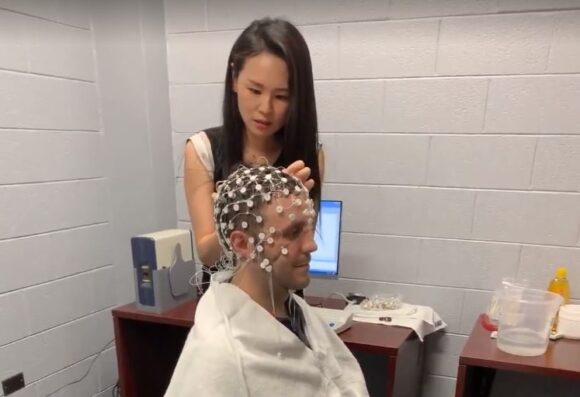
Digital Media Attention and Cognition Lab (DMAC)
Digital Media Attention and Cognition Lab (DMAC)
Features sophisticated eye tracking and facial expression analysis Equipment. Studies how consumers consume and verify news.
- Evaluates the connection of emotion with social media and advertisements
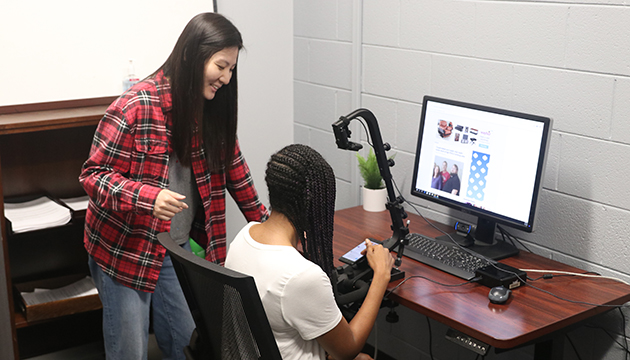
CENTER FOR ADVANCED COMPUTER-HUMAN ECOSYSTEMS
The Center for Advanced Computer-Human Ecosystems (CACHE) is an interdisciplinary research center for a human-centered approach to investigating virtual experiences and how they influence the attitudes and behaviors of users. The center makes forward-thinking inquiries into how interactions in virtual worlds can shift traditional rules and norms of social interactions in the physical world. Projects apply frameworks of psychosocial and behavioral sciences to explore, test and evaluate the impact of virtual and augmented environments on a wide range of social issues.
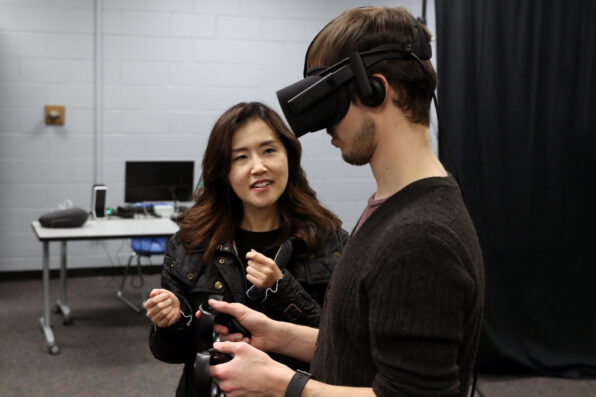
SEE Suite
SEE Suite
Features 20 computer stations with Crimson-Hexagon software and large screens for social media listening and analytics.
- Researches engagement and strategic insights
- Analyzes big data and theory building
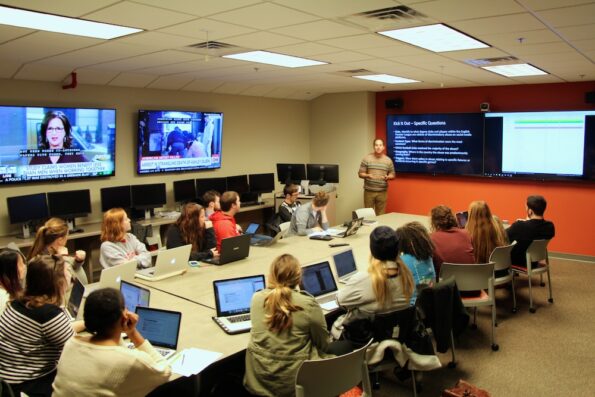
QUALITATIVE RESEARCH LAB
QUALITATIVE RESEARCH LAB
Founded in spring 2022, the Qualitative Research Lab, directed by Dr. Karin Assmann, an assistant professor in the Journalism Department, has the software needed for students, both undergraduate and graduate, to conduct qualitative research, which involves collecting and analyzing non-numerical data, such as interviews and documents. Under Dr. Assmann, the lab also provides a space for student researchers to interact and brainstorm with their peers. The Qualitative research lab is located in room 252.
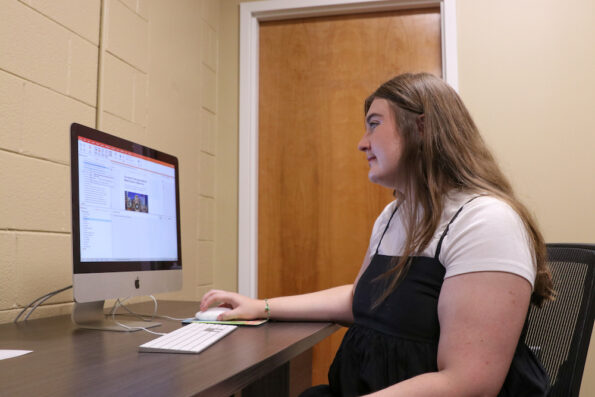
Facilities
Center for Health and Risk Communication
Center for Health and Risk Communication
The Grady College Center for Health and Risk Communication is focused on health and risk communication-related research, teaching and service that advances knowledge about effective and understandable messages to help people make better health-related decisions.
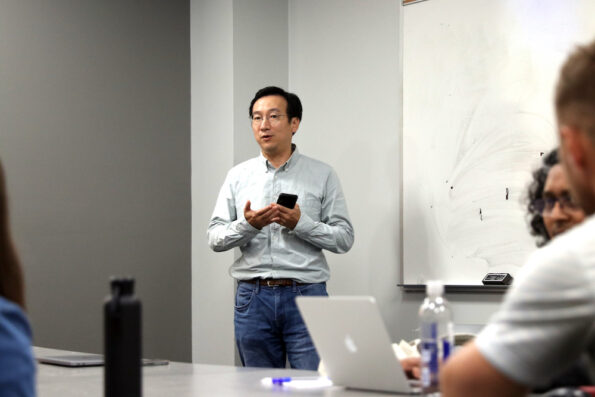
Organizations
AIM Club
AIM Club
‘AIM’ stands for Analytics, Insights, and Measurement and the AIM Club is a central place for graduate students to explore research and professional opportunities. We coordinate multiple faculty-student co-led research groups and host guest presenters covering a wide range of mass communication theories and practices.
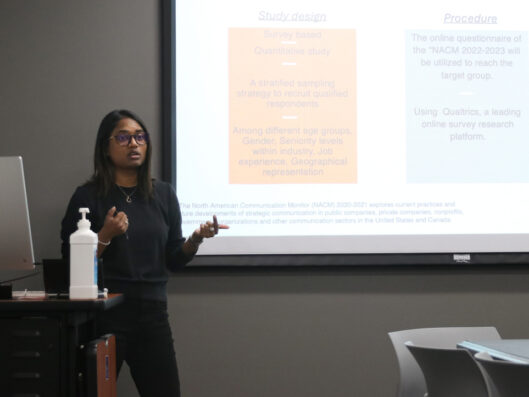
The Latest
Read the newest headlines, get updates and discover events happening at Grady.

Grady InternViews: Amanda Whylie
This is part of a series where we ask Grady College students to describe their internship experience. Amanda Whylie is a fourth-year entertainment & media studies student working at Omnicom […]

Remembering Ruthann Lariscy
Ruthann Lariscy was the type of friend who celebrated birthdays of colleagues deployed overseas by shipping them a party-in-a-box, complete with a birthday cake. She was the type of professor […]

Grady InternViews: Melanie Levi
This is part of a series where we ask Grady College students to describe their internship experience. Melanie Levi is a fourth-year journalism student working with Fox News Channel as […]
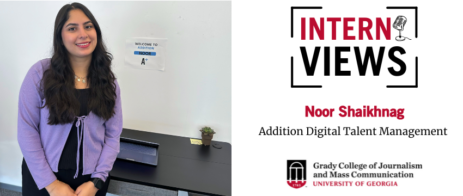
Grady InternViews: Noor Shaikhnag
This is part of a series where we ask Grady College students to describe their internship experience. Noor Shaikhnag is a fourth-year entertainment & media studies and communication studies student […]

Grady InternViews: Ryan Langner
This is part of a series where we ask Grady College students to describe their internship experience. Ryan Langner is a fourth-year advertising student working with Apple as a Partner […]
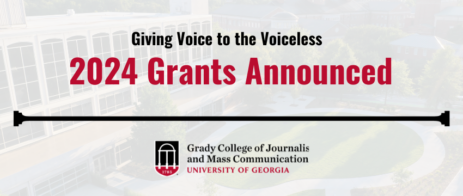
2024 Giving Voice to the Voiceless grants announced
Projects that use music to benefit dementia patients, help Atlanta public school students express their identities and provide an outlet to combat name-based discrimination in science are just a few […]
Events

Tommy Tomlinson Book Reading & Signing
Join Tommy Tomlinson for a book signing session and a reading of his book, “Dogland” at 6 p.m. on July 31, 2024.

Philadelphia Alumni Event
Save the date to join Dean Davis and other alumni for our Grady College networking event in Philadelphia during the AEJMC Conference. Reserve your spot here by August 1.
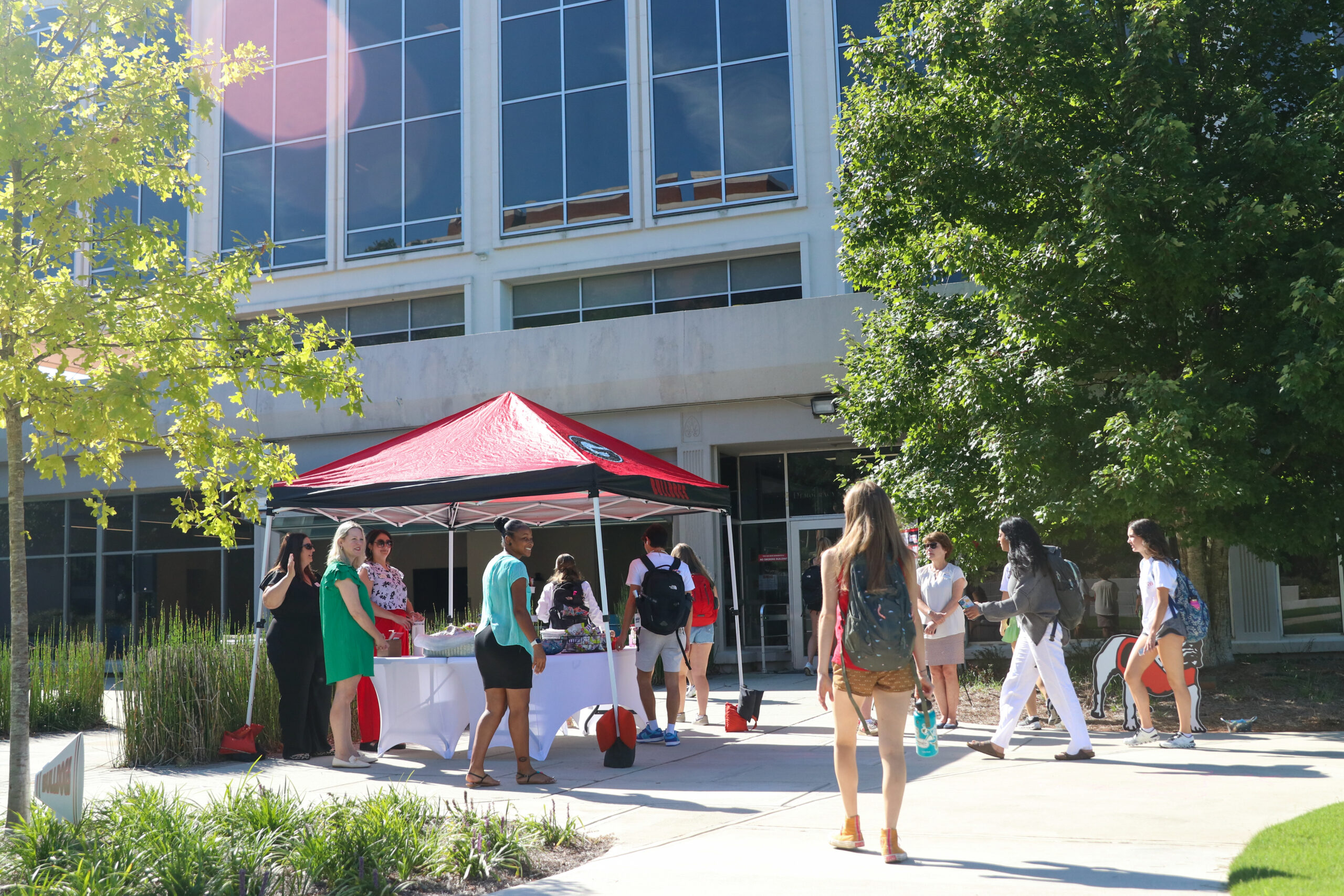
Grady College Welcome Back Fall 2024
Welcome to our new and returning students! Celebrate with snacks, refreshments and activities on the Schnitzer Family Media Lawn from 10 a.m. to 4 p.m. each day!
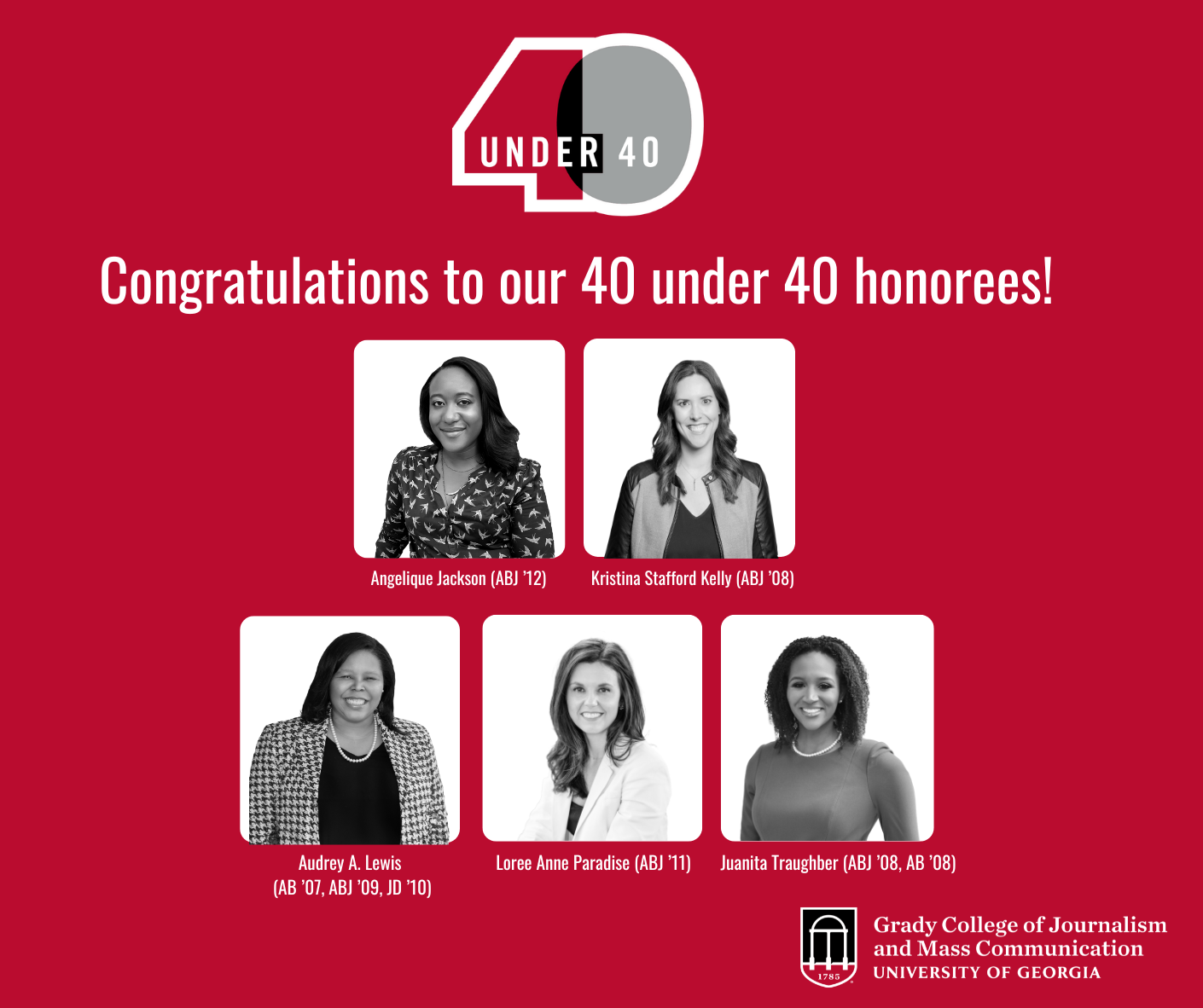
UGA 40 Under 40 celebration
A panel discussion featuring Grady College’s 5 40 Under 40 honorees will be held on September 6, 2024 at 10 a.m. in the Peyton Anderson Forum.
Fall Alumni Board Meeting
Save the date for the fall 2024 Alumni Board meeting. More details will be announced closer to the date.
Maxine Clark Lecture
Join Maxine Clark (ABJ ’71) on September 16, 2024, for a preview of the film “Unstuffed: A Build-A-Bear Story.”
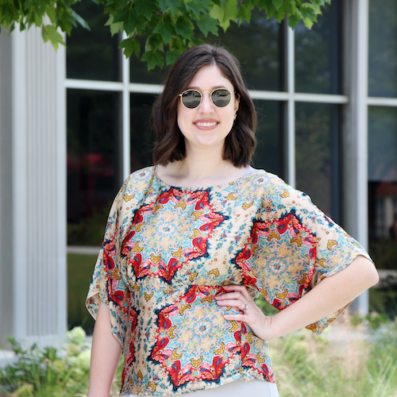
Perspectives
“It’s such an incredible feeling having so many professors believe in me and my interests. Their constant support and guidance have not only helped me create professional and meaningful work but also given me the confidence and direction to pursue my passions.”
Grace Adams
Current PhD Student

Perspectives
“Grady College is one of the best journalism and mass communication colleges in the United States with amazing faculty.”
Anne Perera
Current PhD Student
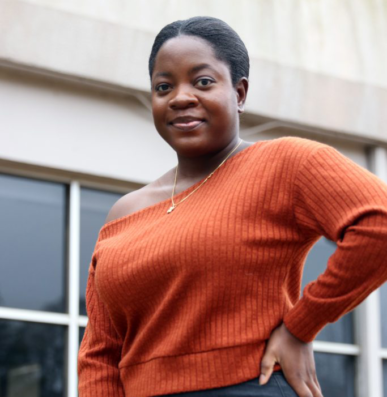
Perspectives
“The highlight of my doctoral education has to be the unending access to like-minded individuals. With my time spent in Grady, I truly believe that there are individuals always willing to assist and answer questions. In my opinion, this makes the entire academic journey much more pleasurable.”
Rhoda Olaleye
PhD ’23

Perspectives
“Since coming to Grady, I have had the opportunity to collaborate with several faculty members on research projects that are in various stages of development. The faculty here really want you to engage in research and take the lead on projects, and the program facilitates those connections for you so you are able to start researching right away.”
Leslie Klein
Current PhD Student
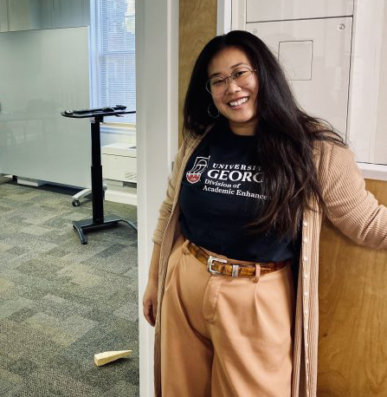
Perspectives
“I knew that Grady was the perfect program to dive deeper into media communication research that would complement my knowledge in interpersonal communication. I am so grateful to be here because I continue to learn from and work with the top scholars dedicated to this research.”
Farrah Youn-Heil
Current PhD Student
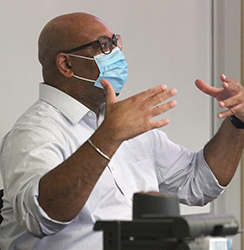
Perspectives
“As a native Georgian, I was aware that Grady College ranked among the best schools of communication in the country. I thought it offered a friendly and collaborative environment.”
Marcus Howard
PhD ‘21

Apply
Your advanced education starts here. Admission to Grady College’s graduate studies is a collaborative process involving Grady College and the University of Georgia’s Graduate School.